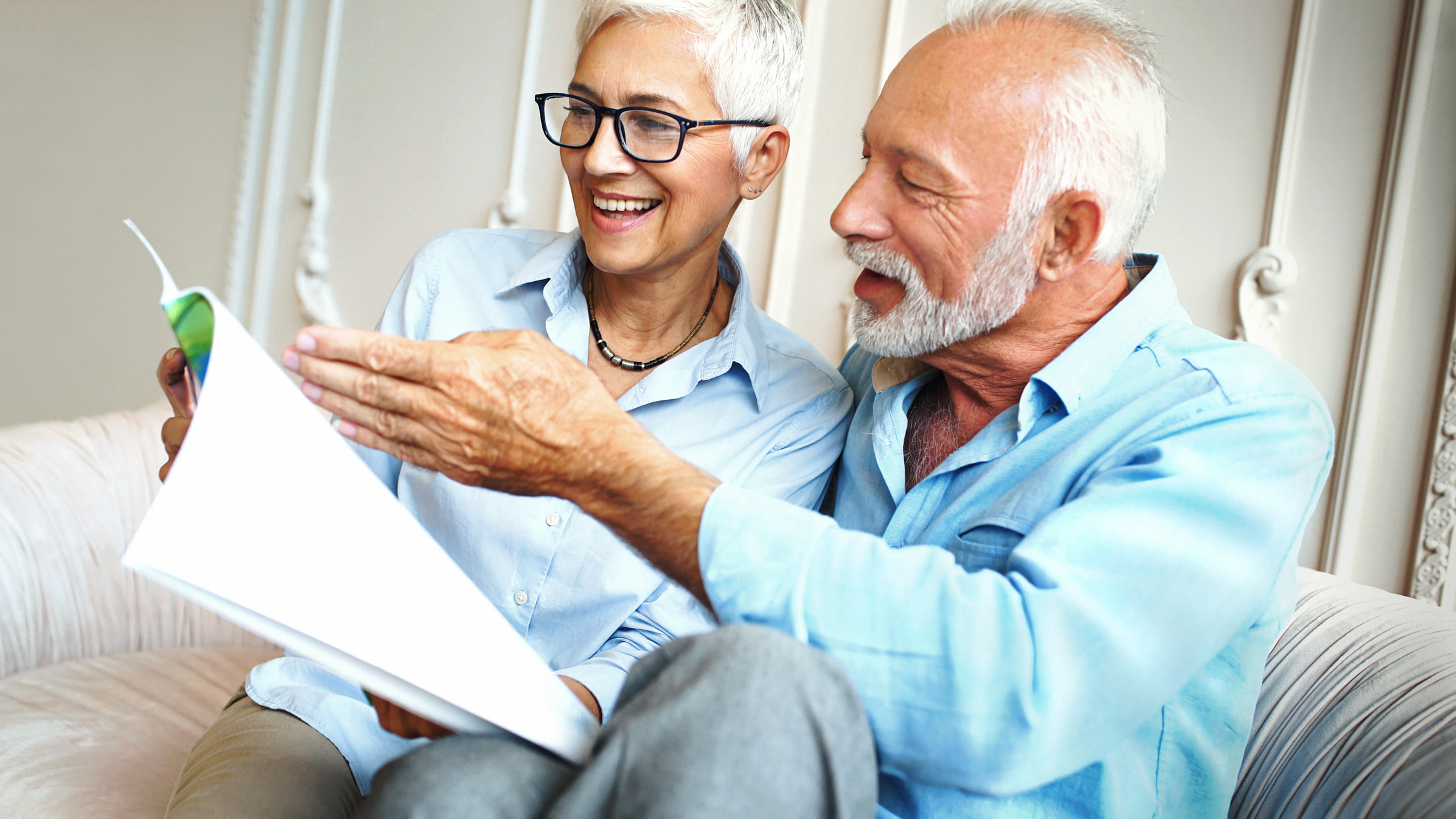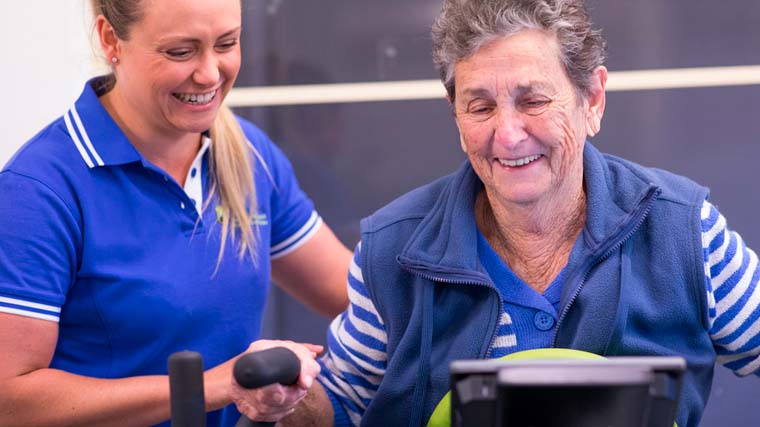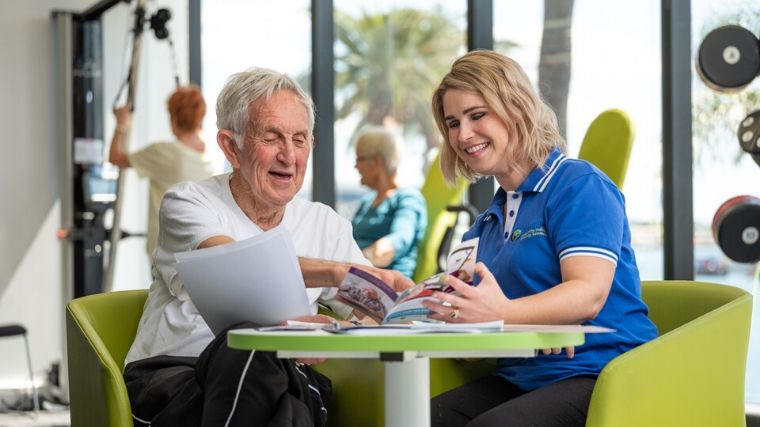Coping with loneliness at Christmas - A mental health guide
For some people, Christmas can be a time of loneliness. It is crucial to look after your mental health or reach out for support.
For most people, Christmas is a time of joy – a time for family and celebrations, but for many older people they can feel alone during the Christmas period. They may have lost friends or partners and find Christmas a very confronting time. It’s really important to reach out if you are struggling or if you notice changes in the person you’re caring for.
A guide to staying well this Christmas when you're alone
You may not realise that your emotional and mental health can have an impact on your physical wellbeing. Now is the time to take stock – reflect on your own feelings and general happiness. Do you avoid outings and catch ups? Do you feel like everything is an effort? Are you struggling to find meaning in your life? Do you want to feel better but you’re not sure how?
Sometimes it takes only a small change to make a big difference. There are lots of ways you can make the most out of this Christmas season.
Here are some mental health tips to help you feel and live well this Christmas.
-
How to find purpose as you age
When we look back and reflect on our lives, we notice that at different stages we had a different purpose.
Purpose will be different for everyone – for some it may have been a career, being married, raising a family, travel, adventure, or maybe creating a home.
As we get older, our lives do change and for many, things may become a little slower and quieter as our families have grown and moved, and careers have ended. For some it can be a time where you can feel a little lost and isolated, feeling that life has left you without purpose.
It is so important to continue to find ways to have purpose in our lives, as it gives us meaning, pleasure and something to work towards.
Our purpose doesn’t have to be too big, as we have done the big things already, and for some of us, we may already have purpose in our lives, but not know it.
Finding purpose starts with refection, reviewing and being prepared to grow and make small changes in our lives.
-
Where to find your purpose:
- Connections – developing stronger relationships with family, friends, and community.
- Spirituality – growing your spiritual knowledge or being more involved in your spiritual community.
- Acts of Service – giving back to the community – volunteering, getting involved in a community project.
- Health and Wellbeing – improving your nutrition, joining an exercise group, going to a Yoga, meditation, or mindfulness class.
- Past activities you enjoyed – thinking of things you have enjoyed in the past, igniting an old hobby or passion.
- New hobbies and interests – are there things you have wanted to do, but have never had the time or courage to try? Now is that time to get started and discover new interests and something to look forward to.
- Knowledge – is there an area of interest that you have always wanted to learn more about? Maybe it’s time to order that new book or enrol in a short course.
-
-
Why is social connection so important?
Chris Crockett, integratedliving's Wellness Lead, said social interaction can have a positive impact on our mood and self-confidence as well as physical wellbeing.
Chris said running Wellness for Independence® programs both face-to-face and virtually has taught her so much about the importance of social connection that we all need as human beings.
“I have learnt through both my own experiences and through my teachings in various programs that no matter how introverted or extroverted individuals might be, it is such a necessary, vital part of health. Without social connection, both mind and physical health will take a tumble,” she said.
“I see it in all of my programs when clients thank me for allowing them to participate in a group to connect and meet new people and form new friendships. Within group programs that I have coordinated, friendships have formed. Clients can connect and share their health stories and support each other long after our programs finish. “
“It’s so important to learn to be in the moment and to have a purpose. In order to have purpose, we need to connect with others.”

-
Can exercise improve your mental health?
Yes, yes and yes! Loneliness and social isolation are common issues shared by older people. The loss of mobility can have an impact on your participation in activities, ability to meet with friends, attend family events, or even keep up with the grandkids. Keeping mobile will help you keep these social connections.
Your mood can also be improved with physical activity. Gentle exercise can increase your self-confidence and resilience, as well as helping to create a positive mindset to help ward off negative thoughts and feelings about ageing.
Try walking, yoga, tai chi or swimming. Visit our Wellness Centres or participate in a virtual exercise class in the comfort of your own home. Explore our exercise resources on our website for ideas to get started.

-
Why is sleep important for mental health?
Sleep is a vital ingredient for good health, but up to 45 percent of Australian adults suffer from sleep problems.
A lack of sleep can affect our concentration, mood, productivity and safety. It can also place us at a greater risk of heart disease and diabetes. Sleep is also thought to help keep the immune system strong and the heart and blood vessels healthy. It allows for growth and healing, as well as helping to control appetite and weight. Sleep promotes attention, memory and learning.
A lack of sleep can make you feel emotionally and mentally more vulnerable. A regular pattern of poor sleep could make you feel irritable, worn out, less tolerant and even trigger anxiety and depression.
The good news is you can greatly improve your sleep quality by making a few small changes to your lifestyle.
-
A few tips to help you get a better sleep:
- Work with your body clock. Getting a better sleep means working with your internal ‘clock’, not against it. Aim to get up at the same time every day. This strict routine will help set your body clock. You will find you get sleepy at about the same time every night. Feeling tired is our body’s signal to rest – listen to your body and go to bed when you feel tired.
- Spend some time outdoors in the early morning sunlight. This helps to set your body clock.
- Invest in a comfortable mattress.
- Ensure sleep clothing, bedding and room temperatures are comfortable.
- Make sure the room is dark and quiet.
- Avoid watching TV or talking on the phone just before you go to bed.
- Avoid caffeinated drinks such as tea or coffee, or chocolate close to bedtime as these can stimulate the mind. Instead try a warm milky drink or herbal tea.
- Exercise every day, but not too close to bedtime.
- Use the last hour before sleep to relax your mind and body.
-
-
Reach out to a provider that can help support you
Remember, you are not alone. There are many providers that offer a range of support services to help you cope at Christmas. integratedliving, for example, provides services such as:
-
Social Support – Staying connected can have a positive impact on wellbeing. integratedliving offers a variety of social support options, such as home visits and virtual social sessions, designed to suit different preferences and help maintain connection with others.
-
Activity Centres – Our friendly staff and volunteers ensure a warm and welcoming environment with meaningful conversation, activities and friendship. We also encourage a healthy and active lifestyle through our range of supportive and inclusive activities that embrace the uniqueness of each individual. Activity Centre locations include Raymond Terrace, Gorokan, Woy Woy and Gosford in New South Wales.
-
Virtual programs to stay connected – We offer a range of virtual programs that can be accessed via a computer, laptop or tablet including:
- Let’s Have a Conversation
- Social Sessions
- Movement Classes
-

Keeping yourself mentally and physically active, finding purpose and activities to look forward to, will bring you positive changes that make you feel better in yourself and better about your life as you age. integratedliving is here to assist you on your journey and help you live, feel and be well.
How to find purpose as you age
When we look back and reflect on our lives, we notice that at different stages we had a different purpose.
Purpose will be different for everyone – for some it may have been a career, being married, raising a family, travel, adventure, or maybe creating a home.
As we get older, our lives do change and for many, things may become a little slower and quieter as our families have grown and moved, and careers have ended. For some it can be a time where you can feel a little lost and isolated, feeling that life has left you without purpose.
It is so important to continue to find ways to have purpose in our lives, as it gives us meaning, pleasure and something to work towards.
Our purpose doesn’t have to be too big, as we have done the big things already, and for some of us, we may already have purpose in our lives, but not know it.
Finding purpose starts with refection, reviewing and being prepared to grow and make small changes in our lives.
Where to find your purpose:
- Connections – developing stronger relationships with family, friends, and community.
- Spirituality – growing your spiritual knowledge or being more involved in your spiritual community.
- Acts of Service – giving back to the community – volunteering, getting involved in a community project.
- Health and Wellbeing – improving your nutrition, joining an exercise group, going to a Yoga, meditation, or mindfulness class.
- Past activities you enjoyed – thinking of things you have enjoyed in the past, igniting an old hobby or passion.
- New hobbies and interests – are there things you have wanted to do, but have never had the time or courage to try? Now is that time to get started and discover new interests and something to look forward to.
- Knowledge – is there an area of interest that you have always wanted to learn more about? Maybe it’s time to order that new book or enrol in a short course.
Why is social connection so important?
Chris Crockett, integratedliving's Wellness Lead, said social interaction can have a positive impact on our mood and self-confidence as well as physical wellbeing.
Chris said running Wellness for Independence® programs both face-to-face and virtually has taught her so much about the importance of social connection that we all need as human beings.
“I have learnt through both my own experiences and through my teachings in various programs that no matter how introverted or extroverted individuals might be, it is such a necessary, vital part of health. Without social connection, both mind and physical health will take a tumble,” she said.
“I see it in all of my programs when clients thank me for allowing them to participate in a group to connect and meet new people and form new friendships. Within group programs that I have coordinated, friendships have formed. Clients can connect and share their health stories and support each other long after our programs finish. “
“It’s so important to learn to be in the moment and to have a purpose. In order to have purpose, we need to connect with others.”
Can exercise improve your mental health?
Yes, yes and yes! Loneliness and social isolation are common issues shared by older people. The loss of mobility can have an impact on your participation in activities, ability to meet with friends, attend family events, or even keep up with the grandkids. Keeping mobile will help you keep these social connections.
Your mood can also be improved with physical activity. Gentle exercise can increase your self-confidence and resilience, as well as helping to create a positive mindset to help ward off negative thoughts and feelings about ageing.
Try walking, yoga, tai chi or swimming. Visit our Wellness Centres or participate in a virtual exercise class in the comfort of your own home.
Why is sleep important for mental health?
Sleep is a vital ingredient for good health, but up to 45 percent of Australian adults suffer from sleep problems.
A lack of sleep can affect our concentration, mood, productivity and safety. It can also place us at a greater risk of heart disease and diabetes. Sleep is also thought to help keep the immune system strong and the heart and blood vessels healthy. It allows for growth and healing, as well as helping to control appetite and weight. Sleep promotes attention, memory and learning.
A lack of sleep can make you feel emotionally and mentally more vulnerable. A regular pattern of poor sleep could make you feel irritable, worn out, less tolerant and even trigger anxiety and depression.
The good news is you can greatly improve your sleep quality by making a few small changes to your lifestyle.
A few tips to help get you a better sleep
- Work with your body clock. Getting a better sleep means working with your internal ‘clock’, not against it. Aim to get up at the same time every day. This strict routine will help set your body clock. You will find you get sleepy at about the same time every night. Feeling tired is our body’s signal to rest – listen to your body and go to bed when you feel tired.
- Spend some time outdoors in the early morning sunlight. This helps to set your body clock.
- Invest in a comfortable mattress.
- Ensure sleep clothing, bedding and room temperatures are comfortable.
- Make sure the room is dark and quiet.
- Avoid watching TV or talking on the phone just before you go to bed.
- Avoid caffeinated drinks such as tea or coffee, or chocolate close to bedtime as these can stimulate the mind. Instead try a warm milky drink or herbal tea.
- Exercise every day, but not too close to bedtime.
- Use the last hour before sleep to relax your mind and body.
Reach out to a provider that can help support you
Remember, you are not alone. There are many providers that offer a range of support services to help you cope with Christmas. Integratedliving, for example, provides services such as:
- Social Support Phone Calls – If you find yourself in need of a chat, integratedliving is offering a social support call service to help you stay connected. You tell us how often you would like us to call and for how long and you can chat to us on any topic you like.
- Activity Centres – Our friendly staff and volunteers ensure a warm and welcoming environment with meaningful conversation, activities and friendship. We also encourage a healthy and active lifestyle through our range of supportive and inclusive activities that embrace the uniqueness of each individual. Activity Centre locations include Raymond Terrace, Gorokan, Woy Woy and Gosford in New South Wales.
- Virtual programs to stay connected – We offer a range of programs that can be accessed via a computer, laptop or tablet including:
- Let’s Have a Conversation
- Social Sessions
- Movement Classes
Keeping yourself mentally and physically active, finding purpose and activities to look forward to, will bring you positive changes that make you feel better in yourself and better about your life as you age. integratedliving is here to assist you on your journey and help you live, feel and be well.